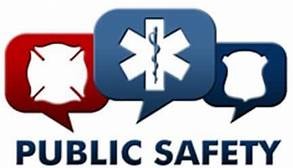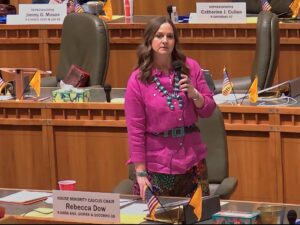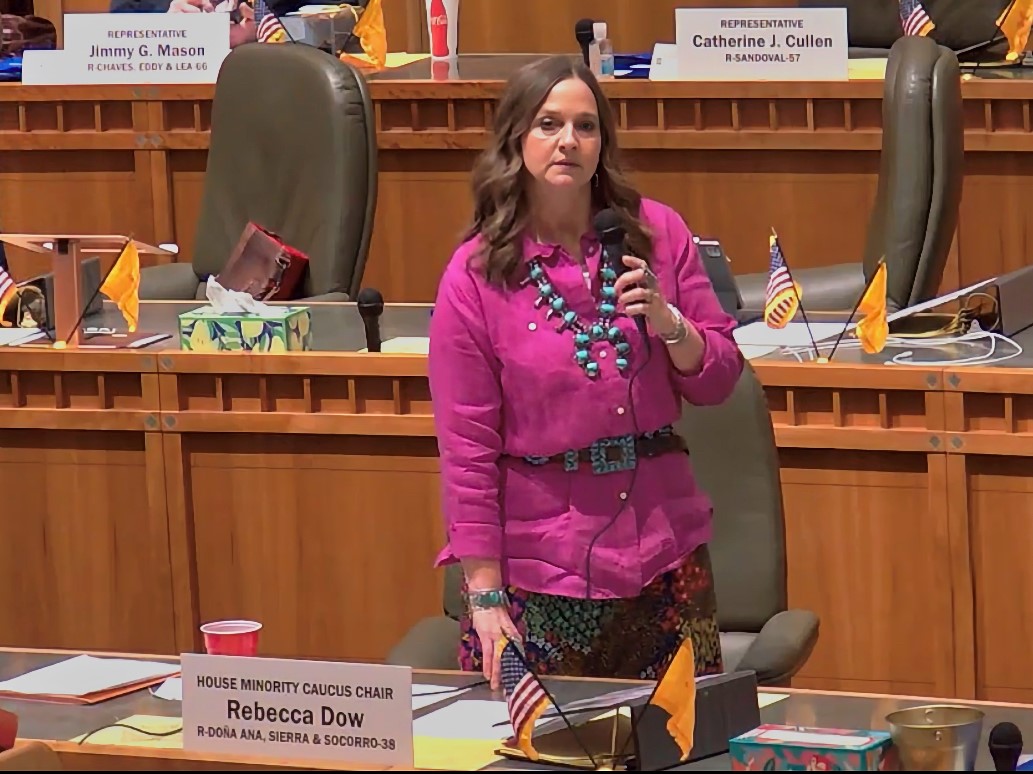PUBLIC SAFETY PACKAGE ADVANCES TO HOUSE FLOOR

This afternoon, the House Judiciary Committee voted 6-4 along party lines to advance House Bill 8, referred to as the Public Safety Package, to the House floor. The package is an amalgamation of six bills previously considered by the Judiciary Committee. Since they were previously heard, no public testimony was allowed today. Here’s a summary of the bills included in the package:
- HB 4, sponsored by committee Chair Rep. Christine Chandler (D-Los Alamos, Sandoval and Santa Fe), is a major overhaul of the criminal competency statute aimed at institutionalizing the truly violent criminals and placing others in behavioral health programs, including court-ordered treatment, if necessary.
- HB 38, sponsored by Rep. Kathleen Cates (D-Bernalillo), would create the crime of unlawful possession of a weapon conversion device that can convert a semiautomatic weapon into a fully automatic weapon. The devices are commonly known as “Glock switches.”
- HB 31, sponsored by Rep. Joy Garratt (D-Bernalillo), would increase the penalty for making a shooting threat.
- HB 16, sponsored by Rep. Charlotte Little (D-Bernalillo), would enhance drug-trafficking sentences by up to three years if fentanyl is involved in trafficking.
- HB 106, sponsored by Rep. Andrea Reeb (R-Chaves, Curry and Roosevelt), would increase blood testing when there is probable cause that an individual is driving under the influence of intoxicating substances of any kind. Does not include cannabis at this time as there is not a reliable test yet.
- HB 50, sponsored by Rep. Cynthia Borrego (D-Bernalillo), would increase penalties for different forms of auto theft. A person could be guilty of a fourth-degree felony for a first offense, a third-degree felony for a second offense, and a second-degree felony for a third or subsequent offense.
The Chamber is supportive of HB 8; however, we were disappointed that increased penalties for felons using firearms, pretrial detention and the definition of harm to self or others were not included.
Reeb and Nicole Chavez (R-Bernalillo) expressed disappointment that nothing is in the package concerning juvenile crime, the largest growing source of violent crime. Reeb said juvenile crime is up 150% in her community. And, while criminal competency reform is important, only 4% of people committing crimes are involved in competency determinations. Chandler said that it’s a very complicated area of law – as complicated as criminal competency – and that it’s going to require a lot of study and analysis to get changes right. Reeb countered by saying that she’s developed a strong bill but can’t get the bill heard.
Rep. Matthew McQueen (D-Sandoval and Santa Fe) was displeased with a package approach. There is at least one bill in the package that he would not vote for if it was a stand-alone measure. He voted for the package but said he might change his vote on the floor. Others also expressed a concern about packaging all the bills.
This package is a vehicle for expedited action on more or less consensus legislation, the goal being to get this over to the Senate so the Legislature can demonstrate that it took action in the first month of the session. Of course, the Senate may have its own ideas of what needs to be included in this package as well. And, there are many other bills dealing with a variety of public safety topics, and passage of HB 8 doesn’t mean these other bills can’t move forward also. We expect that HB 8 will be on the House floor soon, likely on Saturday from what we’ve heard, but Friday could also be possible. We’ll certainly keep you posted.
BEHAVIORAL PACKAGE HEADS TO SENATE FLOOR

A package of bills – Senate Bills 1, 2 and 3 – seek to make a major impact on rebuilding the state’s behavioral health system. The Senate Finance Committee approved all three measures this morning, sending them to the Senate floor. The Chamber supports all three measures. Here’s a rundown on what they do, and for clarity, we’ll discuss them in reverse order.
SB 3
SB 3, sponsored by Senate Majority Leader Peter Wirth (D-Santa Fe), is the linchpin of the package. This bill establishes the structure of regional planning areas coordinated by the Administrative Office of the Courts (AOC), which will be responsible for establishing the process whereby regions will develop plans, prioritize actions to be taken and report results. The AOC’s role is one of facilitator, not to run or manage programs outside the court’s responsibility.
J.D. Bullington gave the following testimony:
“SB 3 is the road map for the implementation of SB 1 and SB 2. It lays out how the AOC will oversee the establishment of behavioral health care regions and the standards that must be met.
“This is a sizable task, but SB 3 ensures that the best data is made available and that the key stakeholders have a seat at the table as the plans are developed and rolled out. The very smart approach is to identify the gaps in providing behavioral health services and then to identify the top five actions that need to be taken to close those gaps.
“This is an iterative process so that every year gaps are reassessed and a new ‘to do’ list is established with relevant actions to be taken. Rebuilding the behavioral health system is essential to improving public safety and offering the appropriate care to those in need. It takes collaboration of all three branches of state government as well as all levels of government and providers throughout the state. We urge a ‘yes’ vote on SB 3.”
All stakeholders will build plans from the regional level, thereby incorporating the unique needs of each region. Each branch of government – judicial, legislative and executive – has a role. The idea is to encourage what Wirth calls “de-siloing,” i.e. collaboration across branches of government and service providers. It is a tailored approach, not a one-size-fits-all dictated from Santa Fe.
There was considerable discussion about whether the guardrails in the bill are sufficient and whether the legislation is being rushed. As Committee Chair George Muñoz (D-Cibola, McKinley and San Juan) pointed out, the state has spent $3.4 billion over the last four years with zero results. Senate Minority Leader Bill Sharer (R-San Juan), a cosponsor of the bill, said that there hadn’t been any results for the last 10 years, and we shouldn’t wait another 10 years to get no results. There was no public opposition and, therefore, SB 3 was given a “do-pass” recommendation on a vote of 10-1.
SB 2
SB 2, sponsored by Sen. Benny Shendo Jr. (D-Bernalillo, McKinley, Rio Arriba, Sandoval & San Juan), is referred to as the “down payment” on rebuilding the behavioral health system. The bill would appropriate $200 million to jump-start the rebuilding. The bill appropriates money to 24 areas to ensure there are resources to complete the purposes of SB 3 and to fund specific agencies or programs.
J.D. Bullington provided the following testimony:
“This bill targets 200 million dollars, most of which will be used by local agencies to tackle behavioral health issues from Assisted Outpatient Treatment to housing and much more. This is a really smart approach – it puts the money where the rubber hits the road – in courts and local agencies that are the backbone of providing services. It also fosters fresh thinking about how to solve problems through innovative techniques.
“Rebuilding the behavioral health system is multifaceted. It takes collaboration and adopting best practices. Let’s face it, we’re behind the eight-ball on this issue, and it’s time to provide the resources necessary to accelerate giving the help to people trapped by addiction or struggling with mental health challenges. The targeted approach of this bill should lend itself to measurable outcomes, allowing successes to be shared statewide. We would appreciate your support for SB 2.”
Once again, there was no opposition. SB 2 was given a “do-pass” recommendation on a vote of 10-1.
SB 1
SB 1, sponsored by Sen. George K. Muñoz (D-Cibola, McKinley & San Juan), seeks to create a $1 billion behavioral trust fund to ensure a long-term, stable source of funding for behavioral health services. The Legislature has established several trust funds, for example the Early Childhood Education Trust Fund, that have grown significantly through investment and from which distributions can be taken annually. The entire $1 billion may not be achieved this year, but it is expected that level can be reached within the next two to three years.
Terri Cole, GACC president and CEO, provided the following testimony:
“While there’s a lot of disagreement over what the best path to greater public safety is, it seems there’s a lot of consensus that we need to strengthen and rebuild the behavioral health system in our state.
“SB 1 takes a bold, swing-for-the-fences approach, seeking a $1 billion permanent fund that would generate ongoing funding for behavioral health. Providing support for those suffering from addiction and other mental health issues doesn’t come cheap, but neither do crimes that are sometimes committed in pursuit of drugs, nor the devastation to families when loved ones are no longer capable of functioning, perhaps even devolving into neglect or abuse.
“A billion dollars is for sure a lot of money. But it’s a matter of priorities. We can’t afford to wait, and we urge the committee to vote yes on SB 1 while the state has the cash to make this important investment. Thank you.”
With little discussion and no opposition, SB 1 was given a unanimous 11-0 “do-pass” recommendation.
HARSHLY CRITICIZED HOSPITAL SALE ACT PASSES

“In the long run, this bill is going to be harmful to New Mexico and the people. We will do more harm in quality and access to care.” -Sen. Martin Hickey (D-Bernalillo), a physician and former CEO of Lovelace
This afternoon, the Senate Health and Public Affairs Committee resumed discussion of Senate Bill 14, the Health Care Consolidation and Transparency Act, sponsored by Sen. Katie Duhigg (D-Bernalillo) and House Majority Floor Leader Rep. Reena Szczepanski (D-Santa Fe). The bill, which was rolled over so the committee could review the substitute version, seeks to require certain hospital acquisitions to receive regulatory approval from the Office of the Superintendent of Insurance (OSI) before the transaction can proceed. OSI can disapprove of a potential acquisition.
J.D. Bullington provided the following testimony at the last hearing in strong opposition to the bill:
“We are opposed to SB 14 because we’re concerned that the bill will have exactly the opposite effect as intended. Why do we say that? Our hospitals, especially our rural hospitals, are often cash-starved because of the high percentage of patients not covered by private insurance. The only solution to their problems may be acquisition by an entity that can bring cash to the table. It’s that or potential bankruptcy.
“SB 14 could potentially block or delay acquisitions that bring solutions, not problems. Our rural hospitals are the backbone of health care delivery in our smaller communities. We can’t afford to put them at financial risk. We need them to be financially healthy in order to compete for medical professionals. We understand that SB 14 seeks to help, not hurt. Unfortunately, we don’t see that as the case and respectfully ask you to vote ‘no.’ “

There were serious, bipartisan concerns expressed about the bill today.
Sen. Martin Hickey (D-Bernalillo), a physician and former CEO of Lovelace, shared with the committee and audience that he ran for re-election because “no-one in this Legislature has had the experience I’ve had in health care – not even close.”
From a faculty practice at UNM, to the first rural VA clinics in the country, Hickey said that in his experience all private equity firms and for-profit institutions that purchase hospitals are not evil, and that private equity is essential to growing New Mexico’s health care system, especially in rural areas. “We couldn’t grow without them.”
Hickey said the vagaries and broad components in the bill are concerning, and that he doubts Duhigg’s goal of ensuring quality and access to care is achievable with SB 14 because that “depends on so many other variables that we have no control over.”
“You aren’t going to get people, just like malpractice insurance, to (come to New Mexico to) lose money,” he said, and the bill’s preordained goal “doesn’t fit the economic reality of America – you can’t demand services be provided” when there isn’t sufficient supply or demand.
Hickey said SB 14 will “end up closing rural hospitals” and “needs a lot more time.” He recommended adding another year to the current law so acquisitions are examined in collaboration with outside experts, as well as Medicaid funding is figured out to keep our state’s hospitals going.
Sen. Jay Block (R-Bernalillo & Sandoval) shared that he has spoken with the CEOs of the hospitals in his area – Lovelace Westside, Presbyterian Rust and Sandoval Regional Medical Center – and all are opposed to SB 14. He agreed the bill needs more work and time.
Duhigg says she sees the bill as a provider protection and said there is an emergency clause so if a hospital is on the verge of closing because of a requirement they can request a waiver from the insurance superintendent.
Also expressing opposition in the prior hearing were the New Mexico Chamber of Commerce, Presbyterian HealthCare System, New Mexico Hospital Association, New Mexico Medical Society, the Greater Albuquerque Medical Association and Nurse Practitioners and the New Mexico Association for Home and Hospice Care. Supporters included the ACLU and trial lawyers.
Hickey said the bill is missing “the input of people who loan money to hospitals and what kind of oversight makes it attractive” and is instead relying on “anecdata” – anecdotes. He added that he anticipates a real crisis with pending federal action on Medicaid.
He proposed passing the bill with no recommendation, with the hope of crafting a plan to roll it for one more year to get that insight.
That motion passed 6-4, and SB 14 heads now to Senate Judiciary. Stay tuned.
COMPLEX WATER QUALITY BILLS APPROVED

A 2023 U.S. Supreme Court decision, known as the Sackett Decision, has narrowed the definition of waters of the United States, which proponents of Senate Bills 21 and 22, sponsored by Senate Majority Leader Peter Wirth (D-Santa Fe), claim leaves 95% of New Mexico’s waters now unprotected by federal regulations adopted in 1972 pursuant to the federal Clean Water Act. Today, Wirth combined the bills into one, the Senate Judiciary Committee Substitute for Senate Bills 21 and 22, which received a “do-pass” recommendation on a party-line 6-3 vote, D’s in favor, R’s opposed.
Testimony was taken just on SB 22 because SB 21 had received public testimony at an earlier hearing. GACC President and CEO Terri Cole stood in opposition:
“Senator Wirth’s goal of wanting to ensure we have clean water is one that we don’t dispute. We’re not arguing about that. Both the new rules and regulations are what concern us. It appears to us that passage of this bill will lead to an increased regulatory burden and unnecessarily complicated process. We could drive producers to Texas or to federal land rather than state leases, losing revenue for New Mexico. We are also concerned about shifting regulation for oil field water discharges from the Oil Conservation Division to the Environment Department. This could result in inconsistency and delay. OCD has the expertise, and we don’t see any reason for that changing.”
SB 21 seeks to have the Environment Department take over regulation that used to be performed by the federal EPA. The estimated cost is $7 million annually and 50 new staff. New rules and regulations would have to be written to issue permits for surface and groundwater discharge, to investigate violations and to enforce regulations. SB 22 would require new regulations controlling water reuse, surface water permits and permit enforcement, increase the regulatory expectation of the Water Quality Control Commission (WQCC) on water quality impact, increase groundwater protections, and clarify rules related to potable water reuse. To say the least, this is a major undertaking. It’s a lot to bite off, maybe too much at one time.
Supporters include an array of environmental organizations. Opposition came from the Dairy Producers, AMAFCA (Albuquerque flood control), New Mexico Farm and Livestock Bureau, New Mexico Mining Association, the San Juan Water Commission and the construction industry. Sen. Crystal Brantley (R-Catron, Doña Ana, Grant, Hidalgo, Luna, Sierra & Socorro) expressed a number of concerns. First, she is unconvinced that the Environment Department is equipped to handle permitting without significant delays. Second, she believes that existing laws and regulations do protect New Mexico waters and such an extensive overhaul is unnecessary and an overreach. Third, there is no cap on the fees that can be charged, which could result in excessive amounts.
Sen. Wirth disagrees and says his bill is a mirror of regulations that we’ve been living with for 50 years and everyone has been comfortable with that. The state doesn’t have a program for regulating surface water discharges, and we need to have that to protect water quality. New Mexico has a lot of “ephemeral” water resources like arroyos that only have water in them when it rains or from storm water discharges. These sources need to be covered.
The bill now goes to the Senate floor.
SCHOOL HEALTH PROTECTION ZONES ADVANCE

We’ve already reported to you several bills that seek to slap more unnecessary regulations on New Mexico’s oil and gas industry. It’s like hunting the goose that lays the golden eggs, without realizing the harm to jobs and the state treasury.
House Bill 35, Children’s Health Protection Zones, was introduced by Rep. Debra Sariñana (D-Bernalillo) and presented today in the House Health and Human Services Committee. The bill creates “children’s health protection zones,” restricting oil and gas operations within one mile of the property line of schools.” It defines schools to include public schools, private schools, daycare facilities, and any parks, playgrounds and recreation facilities associated with a school.
Enrique C. Knell relayed the Chamber’s position on HB 35:
“While the title of the bill shows the good intentions behind it, the fact remains that there are already local setbacks in place in the Permian and San Juan Basins in all oil producing municipalities and counties. These setbacks have been determined through the local ordinance processes that include community feedback, and all oil and gas companies adhere to the ordinances. Oil and gas companies go through extensive environmental siting practices to determine where a well will be both safe and economical. And it is important to note that schools and communities in the basins have not requested additional setbacks – this legislation was devised outside of our oil-and-gas-producing communities.”
The Superintendent of Schools for Carlsbad also opposed the bill and spoke about the children who attend the schools he’s in charge of:
“They are our heart and our soul, and keeping them safe is important. Our communities, our elected officials, our school boards have worked tirelessly for decades in leading any county to address these issues. We do not feel like this bill adds anything to what those representatives do, and for that reason, I would respectfully ask you to vote in opposition.”
The Chamber supports an all-of-the-above approach to energy and understands that we need a reliable bridge to make the Energy Transition Act work. New Mexico’s responsible oil and gas producers are at the heart of that, and HB 35 disregards all the checks and balances already in place that are integral to their operations.
Debate got pointed, and the sponsors of the bill got a little defensive when faced with questions by Rep. Elaine Sena Cortez (R-Lea), who lives in the heart of the Permian Basin and is raising her daughter there.
Sena Cortez asked, “Why are you doing this now, and regulating five hours away, when this impacts my district the most and people in my area are fighting against this and we’re alive, we’re healthy, we’re well.”
Before the sponsor could answer, Chair Elizabeth “Liz” Thomson (D-Bernalillo) cut off the conversation and directed Rep. Sena Cortez to move on, telling her she was getting “too personal” in her questioning. Sena Cortez then asked what local leaders were consulted. Sponsors responded that they tried to get hold of local officials but were unable to. Sena Cortez’s follow-ups were once again cut off by the chair.
Sena Cortez went on to say, “I also have a list of the moms and the grandmas that this would impact the most in the southeastern part of the state, and they feel offended that you’ve portrayed our kids are getting poisoned or that we have poisoned our children. And I guess my biggest question is, no one is paying attention to the local leaders, the city officials, the county officials, the mommas and the grandmas that this impacts the most.”
A request was made for Deborah Kaden, a toxicology expert from MIT, to provide a factual presentation on toxicology:
“My name is Dr. Deborah Caton, and I stand in opposition to House Bill 35. I’m a Ph.D. toxicologist with over 40 years experience… I would like to speak to claims of health risks resulting from schools being located within a mile of oil and gas development sites, or OGD… These studies evaluated multiple chemicals individually and the combined risk posed by exposure to all the chemicals at once. Most only examined distances greater than half a mile, and those found no significant health risks. The few studies that examined distance closer to OGD sites were too flawed or inconsistent, even within the study itself, to generate valid risk estimates. The bottom line is that when examining the body of scientific literature, the rate of evidence does not support a conclusion that living or going to school within one mile of an oil and gas development site will result in adverse health effects.”
The bill ultimately received a lukewarm reception, getting passed out of committee with no recommendation on a partisan 6-4 vote. It now goes to the House Judiciary Committee for further consideration.
COUNSELING COMPACT ON TO HOUSE JUDICIARY

The House Health and Human Services Committee this morning unanimously passed House Bill 217, Counseling Compact and Mental Health Services. The bill now heads to the House Judiciary Committee.
It’s no secret we have a dire shortage of all medical professionals in New Mexico. Making it easier for licensed providers in other states to practice in our state – in person or in a telehealth setting – is a real way to get more New Mexicans the care they need. It’s also a way to address the lack of providers here while at the same time encouraging them to practice in, perhaps even move to, our state.
Enrique C. Knell addressed the committee and advocated for New Mexico to enter the Counseling Compact:
“We all know how important attracting mental health professionals is as we wrestle with rebuilding the state’s behavioral health system. HB 217 offers one answer to how we attract these professionals to New Mexico.”
We’ve told you about several bills that enter New Mexico into various interstate health care compacts, each designed to bring health care professionals to our state and ease the licensing burden for those already licensed in other states.
This specific bill addresses the interstate practice of licensed professional counselors, with the goal of improving access to professional counseling services. Other bills in the legislative pipeline include compacts for audiology and speech-language pathologists, occupational therapists and physical therapists.
We’ll keep tracking them all for you.
SENATE ED OKs SCHOOL CELL PHONE BAN

They are ubiquitous – accounts and videos of students distraught over cyberbullying, of violent campus fights, of cheating on classwork and tests.
This morning the Senate Education Committee voted 5-3 to “do-pass” Senate Bill 160, Student Use of Wireless Communication Plans, sponsored by Sen. Antonio “Moe” Maestas (D-Bernalillo), to begin to address the problem. The Chamber was there to advocate for the important reform.
D’Val Westphal, executive vice president of policy and programs with the Greater Albuquerque Chamber of Commerce, testified that SB 160:
“Wisely allows PED to set a uniform policy regarding cell phones, tablets, laptops, and gaming devices in classrooms. It has fair and smart carve-outs for teacher discretion and student accessibility needs, and allows students to use their devices during non-instructional hours.
“The Chamber advocates for policies that support teachers, raise student academic performance and support healthy social development of our students. We support this bill because it will align with all those policies that we believe will improve our education system.
“Specifically, the bill will help teachers do their already difficult jobs and will help students focus academically and even socially.
“And it’s needed. A recent survey showed that 97% of 11- to 17- year-olds use their phone in some way during school hours. The FIR cites multiple studies that have shown the negative effects of cellphones in classrooms on mental health, bullying, and teaching and learning. We urge your support of SB 160. Thank you.”
Maestas made it clear his bill as amended establishes a baseline policy on wireless communication devices during instructional time, giving school districts something to build on and preserving their local control to determine specifics and training. Removing a state mandate for training, he explained, also removed the need for an appropriation. The amendment also added smart watches to the list of devices enumerated in the bill.
Joining the Chamber in support of SB 160 were:
- The New Mexico School Superintendent Association, which shared a recent survey shows 74% of superintendents support a ban given the prevalence of bullying, cheating, filming fights or students and teachers without permission and the data that shows student outcomes improve under bans, and they are more engaged.
- New Mexico Kids Can, which shared that Ohio, Minnesota and Virginia have similar policies to SB 160 and Louisiana, South Carolina and Florida go further with all-out bans.
- Teach + New Mexico.
- Public Charter Schools of New Mexico, which said many charter schools already have a similar policy in place and adopting SB 160 will make it the norm.
Opposition was voiced by the New Mexico School Board Association and the New Mexico Coalition of Educational Leaders and focused on SB 160 wresting local control from districts and being an unfunded mandate, both addressed by the sponsor and the amendment.
If codified into statute, SB 160 would take effect this fall for the coming school year.
Committee member Sen. Martin Hickey (D-Bernalillo), a physician, emphasized this is a statewide mental health issue and the Legislature is right to act.
SB 160 is headed to Senate Health and Public Affairs next – we’ll let you know what happens in that committee.
MATH EDUCATION BILL GETS 9-0 ‘DO-PASS’

Senate Education Committee Chair Sen. William Soules (D-Doña Ana), a career educator, shared in committee last week that while math might not be as popular as reading when we talk about proficiencies and intervention, the fact is we all pay a “math tax” in this life. We pay it when we get someone else to do our taxes, he explained, and when we are taken advantage of or swindled.
Today the committee heard his proposal to address not only the “math tax” issue but also that math education was a larger focus of the landmark Yazzie-Martinez education ruling that reading. (Senate Bill 235, Math and Science Education Improvements had been rolled until today for a committee substitute that adjusts language and sets a take-effect date of 2026 to provide adequate lead time. The substitute was quickly amended to remove stray references not caught as it was being crafted.)
The Chamber stood in strong support of SB 235, with EVP D’Val Westphal testifying:
“I’m here to happily testify in favor of a really smart bill, sponsored by a career educator, designed to not only establish statewide math requirements in K-12, but employ screening and interventions for students struggling with math, as well as math coaches.
“Given our state’s abysmal math proficiency rates – less than one in four students can do math at grade level, and it gets worse in the later grades according to the LESC analysis – this bill is long overdue, and we applaud the sponsor for bringing it forward.
“We at the Chamber believe every New Mexico child can learn, and SB 235 will ensure our schools and teachers have the tools they need to help all children learn math.
“We heartily endorse this bill and encourage you to vote yes. Thank you.”
There was zero opposition to the bill this morning. Joining the Chamber in support were:
• New Mexico Higher Education Secretary Stephanie Rodriguez, who said the fifth-grade screenings are especially important as she has dyscalculia (she described it as dyslexia with numbers) and struggled for 15 years until being diagnosed in college – something she says SB 235 can save our students from.
• Stan Rounds, executive director at New Mexico Coalition of Educational Leaders.
• The New Mexico School Board Association.
• The Albuquerque Federation of Teachers union.
• Think New Mexico.
• The division director of curriculum and instruction for the Public Education Department, who said it is time to do for math what we do for English.
• New Mexico Kids Can, which highlighted the parental notification portion so families can be engaged with their student’s progress.
• Teach + New Mexico, which lauded the early intervention.
• The New Mexico Partnership for Math and Science Education.
• NM MESA, which stands for Math, Engineering and Science Achievement.
• The Math and Science Advisory Council.
With that kind of support and zero opposition, the bill quickly received a unanimous 9-0 “do-pass” vote and is also headed to Senate Health and Public Affairs. We’ll keep you up to date on what happens next with this popular bill!
SPECIAL EDUCATION REFORM ADVANCES

First up in Senate Education this morning was Senate Bill 38 as amended, simply titled Special Education Act, that builds on makes important changes in this field. It’s sponsored by Senate President Pro Tempore Mimi Stewart (D-Bernalillo).
The Chamber again testified in support, with D’Val Westphal saying:
“This bill is designed to make sure New Mexico’s special education students receive the care and attention they need and deserve, starting when they are in preschool. In great part this codifies work already being done by the Office of Special Education.
“It creates the Office of Special Education within the Public Education Department and includes students with disabilities and gifted students in the definition of special education.
“That’s important – our special education students deserve a uniform standard of education no matter what district they attend – that’s why it’s essential OSE not only continue with its oversight and enforcement of state and federal special education law, but also train all school boards and governing bodies, school administrators, and school personnel on specific topics related to the education of students with disabilities.
“This bill is about putting special ed students first. Please support it. Thank you.”
Stewart explained the bill honors the governor’s executive order on special education from several years ago along with subsequent legislation to “ensure we have the right people working on these issues.” She said currently, the Special Education ombudsman works with students and parents, but because they are not part of the Public Education Department, they are not readily a part of any solution and are unable to use the “powers of PED” to improve things.
Joining the Chamber in support was an impressive list of professionals in the field: Disability Rights New Mexico, Albuquerque Sign Language Academy, the Office of Special Education, the New Mexico Commission for the Blind, the National Education Association teachers union, Teach+ New Mexico and the Developmental Disabilities Planning Council. They applauded the transparency and accountability the bill provides, and the bridge for the ombudsman to find solutions and meet the needs of students.
As an experienced special education teacher herself, Stewart shared she is excited about the improved statewide IEPs (individualized education programs) as the ones she has dealt with are “pretty miserable.” Committee Chair Sen. William Soules (D-Doña Ana), also a career educator, agreed, saying in his experience they take hours.
The lone voice in opposition was Stan Rounds, executive director at New Mexico Coalition of Educational Leaders, who said SB 38 is unnecessary as current laws cover what’s needed.
The majority of the committee sided with the majority of public commenters and voted 5-3 to send SB 38 it on to Senate Finance. We’ll be there to let you know where this important bill goes next. Kudos to the sponsor!
K-12 MENTAL HEALTH SUPPORT ON MOVE

The last bill up in the busy Senate Education Committee this morning was Senate Bill 238, Youth Behavioral Health Prevention Act, sponsored by Senate President Pro Tempore Mimi Stewart (D-Bernalillo). The Chamber testified in strong support of SB 238 as well.
D’Val Westphal, executive vice president of policy and programs with the Greater Albuquerque Chamber of Commerce, testified that:
“According to the state Department of Health, our suicide rate is the fourth-highest in the nation. While the causes are individual, common characteristics include alcohol and substance abuse, mental illness, trauma or abuse, family health history, easy access to lethal means and the stigma or sense of isolation associated with asking for help.
“SB 238 tackles this head-on, appropriating funding to PED to establish a digital platform that provides our students with online behavioral health education resources, pre-moderated peer-to-peer support services, and online private sessions with state-licensed behavioral health professionals.
“The CDC has established that student mental health is a key contributor to a student’s academic success. Research has found that mental health conditions like anxiety and depression are linked to reduced academic performance. Students struggling with their mental health are more likely to contemplate or engage in suicide or self-harm, experience disciplinary issues, and be chronically absent.
“SB 238 will help ensure our students have access to the mental health support they need to succeed both academically and in life. We commend the sponsor for bringing this to bill forward, and we urge your support. Thank you.”
Joining the Chamber in support of SB 238 were Stan Rounds, executive director at New Mexico Coalition of Educational Leaders, the National Education Association teachers union, and the mother of a five-year-old who tried to take his life last year. Her emotional testimony put a spotlight o the struggle families face in trying to find services and support for their students.
There was no opposition to the bill, and with a 7-2 “do-pass” vote, SB 238 is headed to Senate Finance – we’ll be there to let you know what happens.
PROTECTING THOSE WHO PROTECT AND SERVE

Let’s face it: Being a cop is not the easiest job. Every single day, they choose to run toward danger to protect us. “Protect and serve” isn’t just a slogan. It’s what law enforcement officer do day in and day out. With that in mind, Rep. Andrea Reeb (R-Chavez) presented House Bill 10, Battery on Peace Officer Penalty, before the House Judiciary Committee. The committee passed the bill unanimously, and it heads to the House floor next.
The bill increases the penalty for assaulting a police officer from a third-degree to a second-degree felony. What this means in practical terms is that the statute of limitations for prosecution is increased from five to six years, the basic sentence is increased from three to nine years, and the potential fine is increased from $5,000 to $10,000.
“They often have to face violence in the course of their daily duties. It’s a tough job,” said Terri Cole, President and CEO of the Greater Albuquerque Chamber of Commerce, as she asked the committee to support the effort to protect police officers. “We need to signal that assaulting a police officer is a serious offense, and offenders will be punished accordingly. Let’s support our officers by passing HB 103.”
The New Mexico Attorney General’s Office points out in its written analysis that the law currently imposes a steeper penalty of nine years for attempting but failing to shoot a peace officer than it does for successfully shooting a peace officer with a firearm. That only carries a sentence of three years. Increasing the penalty as proposed by HB103 brings the “penalty in line with and equal to the penalty for aggravated assault on a peace officer with intent to commit a violent felony.”
The only testimony opposing the bill came from the Law Office of the Public Defender, which argued that prosecutors and judges already have sufficient tools to ensure that violent batteries receive appropriate penalties. We disagree and, thankfully, so did the members of the House Judiciary Committee. On to the full House next!
PUBLIC SAFETY COMES IN MANY FORMS

Stop, Look and Listen – that’s the mantra of House Bill 160, sponsored by Rep. Patty Lundstrom (D-McKinley). Currently at railroad crossings, only trains have the right-of-way over all other traffic. The bill would add “other on-track equipment” at all railroad-highway grade crossings.“Other on-track equipment” is “any car, rolling stock or other device that alone or coupled to another device is operated on stationary rails.” The bill would require all drivers, including school bus drivers and drivers carrying hazardous materials, to abide by certain stopping distance requirements when approaching “other on-track equipment,” not just trains.
Chamber President and CEO Terri Cole voiced support for the measure. “This is common-sense legislation to help protect both the public and train equipment operators. There has been an increase in accidents and injuries resulting from failure to stop, look and listen for any equipment operating on the rails. This measure should help improve safety.”
The bill received a “do-pass” from the House Judiciary Committee and will now move to the House floor.
IN THE HOUSE

New Mexico Family Day Celebrated
New Mexico families are the backbones of our communities, and House Memorial 22 recognized the importance of families in strengthening our state. Many members rose to recount stories about the importance of their families in providing support, safety and love. Also honored today were young folks participating in the YMCA students in government program. And, the Boy Scouts of the Conquistador Council (Southeast New Mexico) were recognized and introduced.
SIGNING OFF FROM SANTA FE

Some very major legislation saw movement today, from behavioral health to public safety and water quality. The legislative wheels continue to pick up momentum. Very shortly, we will see these bills reach the floors of both chambers, which will result in lively debate. In fact, we expect the public safety package to be on the House floor before the week is done. We also expect that beginning next week, the House will begin to hold both morning and afternoon/evening sessions. The Senate does not usually do split sessions but rather conducts long morning/afternoon sessions, pushing committee meetings into late afternoon/evening time slots. On Friday, a joint session will honor African American Day, and on Monday, a joint session will hear from both of New Mexico’s U.S. senators and one U.S. representative. The House will hold a Saturday floor session along with committee meetings. We’re uncertain about the Senate at this time. The House convenes at 10:30, the Senate at 11:30, tomorrow. And, lest we forget, you’re down to one shopping day until Valentine’s Day, not counting this evening, which we hope you are enjoying with your family. We’ll see you tomorrow.




